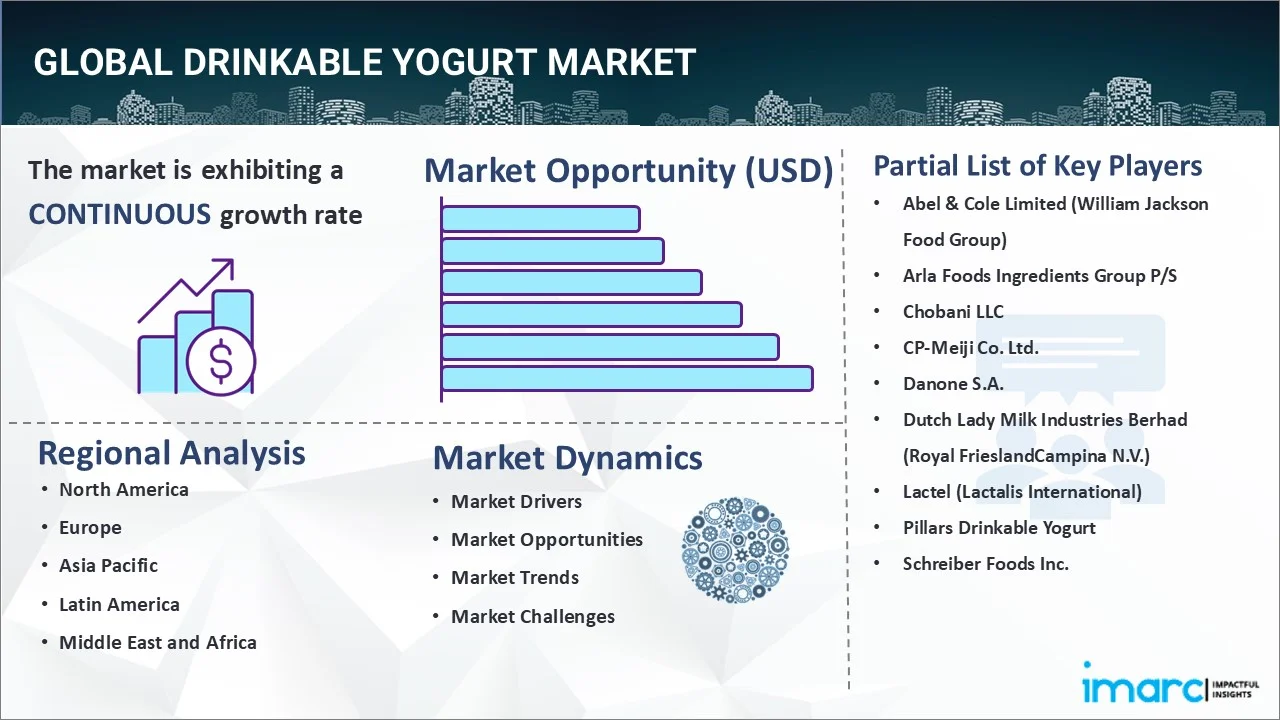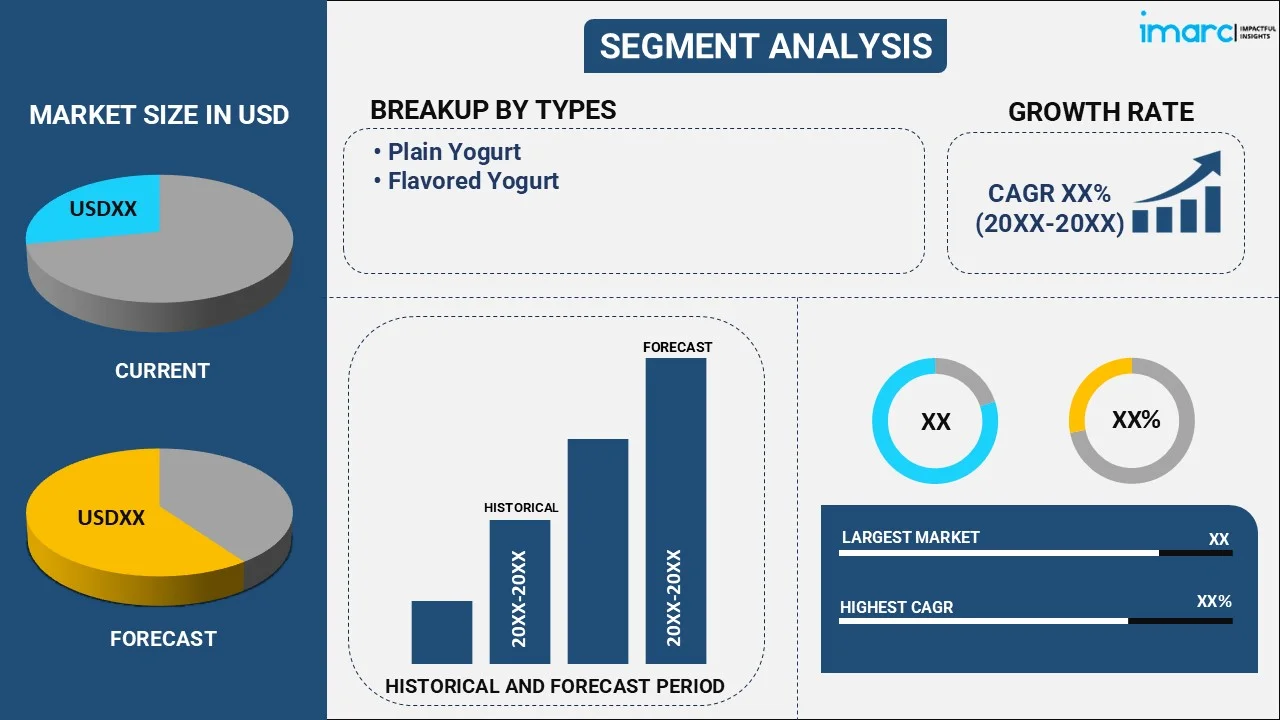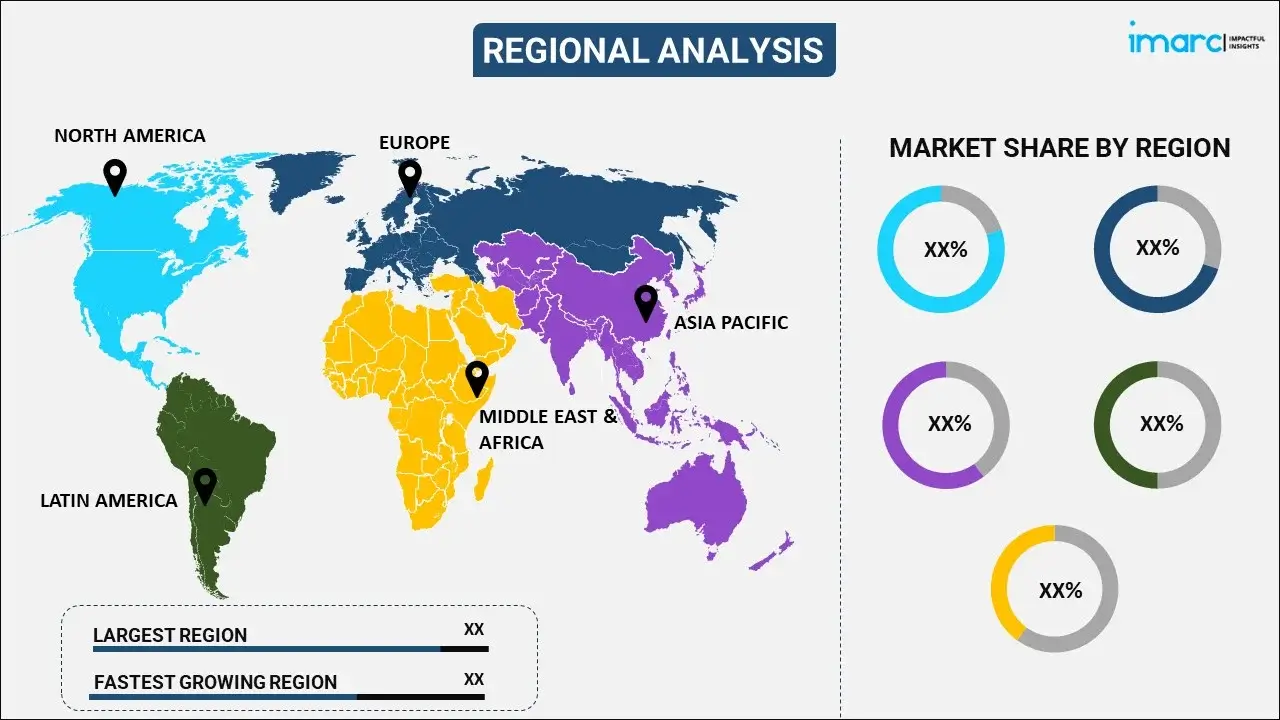
Drinkable Yogurt Market Report by Type (Plain Yogurt, Flavored Yogurt), Category (Dairy-Based Yogurt, Non-Dairy Based Yogurt), Distribution Channel (Supermarkets and Hypermarkets, Convenience Stores, Specialty Stores, Online Stores, and Others), and Region 2025-2033
Global Drinkable Yogurt Market:
The global drinkable yogurt market size reached USD 40.3 Billion in 2024. Looking forward, IMARC Group expects the market to reach USD 64.0 Billion by 2033, exhibiting a growth rate (CAGR) of 4.84% during 2025-2033. The market is experiencing moderate growth driven by the increasing consumer demand for convenient and healthy dairy-based beverages, rising health consciousness, innovations in flavors and packaging, and effective marketing strategies offering a wide range of flavors and nutritional benefits.
|
Report Attribute
|
Key Statistics
|
|---|---|
|
Base Year
|
2024
|
|
Forecast Years
|
2025-2033
|
|
Historical Years
|
2019-2024
|
|
Market Size in 2024
|
USD 40.3 Billion |
|
Market Forecast in 2033
|
USD 64.0 Billion |
| Market Growth Rate 2025-2033 | 4.84% |
Global Drinkable Yogurt Market Analysis:
- Major Market Drivers: The increasing focus on health and wellness is a major driver of the drinkable yogurt market. In addition to this, the escalating demand for healthy, ready-to-drink, and on-the-go beverages is further propelling the growth of the market.
- Key Market Trends: Technological advancements, particularly in terms of packaging and preservation techniques are primary key trends for the market. Innovations, such as extended shelf-life packaging, are improving product quality and convenience for consumers.
- Geographical Trends: According to the report, Asia Pacific accounted for the largest market share. Asia Pacific is a significant region in the drinkable yogurt market. The growth of the market in this region is driven by a combination of factors. The increasing adoption of Western dietary habits, including the consumption of dairy-based products, such as drinkable yogurt, has boosted product demand.
- Competitive Landscape: Some of the leading players in the global drinkable yogurt market include Abel & Cole Limited (William Jackson Food Group), Arla Foods Ingredients Group P/S, Chobani LLC, CP-Meiji Co. Ltd., Danone S.A., Dutch Lady Milk Industries Berhad (Royal FrieslandCampina N.V.), Lactel (Lactalis International), Pillars Drinkable Yogurt, Schreiber Foods Inc. etc., among others.
- Challenges and Opportunities: Challenges include fluctuating milk prices, consumer preference shifts, and supply chain disruptions. However, opportunities arise from the growing demand for probiotic-rich products and the potential to expand into emerging markets.

Global Drinkable Yogurt Market Trends:
Increasing Health and Wellness Trends
The increasing focus on health and wellness is a major driver of the drinkable yogurt market. Consumers are becoming more health-conscious and are seeking convenient, nutritious options. In response to this demand, various key market players are introducing low-fat and high-protein drinkable yogurt beverages, which is creating a positive outlook for the overall market. For instance, Morinaga Nutritional Foods Inc. launched a low-fat Japanese-style yogurt drink under its popular Alove brand in three flavors- original aloe vera, strawberry banana, and coconut in March 2018. Furthermore, consumers are seeking healthier and more natural ingredients in drinkable yogurts, such as stevia, instead of bulk sweeteners to reduce calories. According to an article published in Food Dive in June 2021, approximately 70% of consumers eat yogurt for general health and wellness and 60% for digestive/gut health. As consumers become more informed about the benefits of probiotics, the demand for drinkable yogurt is expected to continue growing.
Growing Convenience and On-the-Go Consumption
The fast-paced lifestyles of working individuals have led to a growing demand for convenient, on-the-go food options. Drinkable yogurt fits perfectly into this lifestyle, offering a portable and easy-to-consume source of nutrition. Its single-serving packages make it a practical choice for busy consumers who may not have time for traditional sit-down meals. In addition to this, various key market players are extensively investing in promoting and marketing their on-the-go healthy and nutritious beverages to expand the consumer base and increase sales. For instance, in June 2021, KeVita, a leading brand of high-quality fermented beverages, collaborated with Amber Riley, an American actress and singer, to launch KeVita Prebiotic Shots, an on-the-go drink offered in a convenient two-ounce bottle to help support digestive health. Similarly, in January 2020, Stonyfield Organic launched its probiotic yogurt drink, Daily Probiotics, in a 3.1-oz easy-to-drink format to support both immune and digestive health in the U.S. The drink was made available in two flavors, Blueberry Pomegranate and Strawberry Acai.
Diverse Flavor Profiles and Product Innovations
The introduction of drinkable yogurt in distinctive flavors, such as the savory flavor of vegetables- carrots, beetroot, and tomatoes is offering lucrative growth opportunities to the overall market. Furthermore, various manufacturers are constantly introducing new formulations to cater to varying consumer preferences. Additionally, companies are exploring different bases, such as dairy-free alternatives, such as almond and coconut milk, to cater to lactose-intolerant and vegan consumers. Moreover, various key market players are infusing functional ingredients like vitamins, protein, and fiber to enhance the nutritional profile of the drink and attract consumers looking for added health benefits. For instance, in March 2021, Horizon Organic Growing Years expanded its line of milk-based products that focus on overall health and well-being. The new products were developed in partnership with pediatricians and are fortified with DHA, choline, & other nutrients and include new low-fat yogurt pouches, cultured dairy smoothies, reduced-fat milk half-gallons, & single-serve whole-milk boxes.
Rising Awareness about Probiotics
Probiotics are known to provide health benefits when consumed in adequate amounts. Many drinkable yogurt products are marketed as probiotic-rich, emphasizing their potential to improve digestive health and boost the immune system. Moreover, the increasing awareness regarding the benefits of consuming probiotics is resulting in a bolstering demand for yogurt drinks incorporated with these beneficial microorganisms. As a result, various industry players are launching yogurt drinks infused with probiotics. For instance, Agriton U.K. launched a fermented probiotic drink called EDM Drink, which contains a mixture of naturally occurring organisms, such as lactic acid bacteria and yeasts. The product also includes multiple nutrients like vitamin C, zinc, potassium, malic acid, and citric acid, which support digestion. According to studies published by Grande Cheese Company in July 2021, yogurt helps reduce the risk of high blood pressure, a major contributor to heart disease, by as much as 50%. Similarly, in April 2022, the International Food Information Council (IFIC) conducted a study titled "Consumer Insights on Gut Health and Probiotics," which revealed that approximately 32% of individuals actively make an effort to consume probiotics, with 60% of them aiming to consume probiotics once a day and 24% attempting to consume them multiple times daily. This rising awareness regarding probiotics is anticipated to propel the drinkable yogurt market sales in the years to come.
Drinkable Yogurt Industry Segmentation:
IMARC Group provides an analysis of the key trends in each segment of the market, along with forecasts at the global, regional, and country levels for 2025-2033. Our report has categorized the market based on type, category, and distribution channel.
Breakup by Type:

- Plain Yogurt
- Flavored Yogurt
Flavored yogurt accounts for the majority of the market share
The report has provided a detailed breakup and analysis of the market based on the type. This includes plain yogurt and flavored yogurt. According to the report, flavored yogurt represented the largest segment.
Flavored yogurt is the largest and most dynamic segment in the yogurt market due to its wide array of tastes and consumer appeal. This segment encompasses yogurt infused with a variety of flavors, including fruit, vanilla, chocolate, and more. Manufacturers are offering an extensive range of flavors, appealing to different age groups and preferences. For instance, Danone launched Wallaby, a line of Aussie Crème Yogurts in the United States that is an organic gluten-free yogurt with low sugar and is available in three bold flavors such as spiced peach, strawberry red wine, and caramelized pineapple. Similarly, in March 2022, Muller Yogurt & Desserts launched its latest Australian-inspired yogurt in the United Kingdom. It is a creamy yogurt that has a 3-in-1 fruit blend in the corner, including a mixture of mango, passionfruit, and coconut.
Breakup by Category:
- Dairy-Based Yogurt
- Non-Dairy Based Yogurt
Non-dairy based yogurt holds the largest share in the industry.
A detailed breakup and analysis of the market based on the category have also been provided in the report. This includes dairy-based yogurt and non-dairy based yogurt. According to the report, non-dairy-based yogurt accounted for the largest market share.
Non-dairy-based yogurt, also known as plant-based or dairy-free yogurt, has experienced remarkable growth and diversification in recent years. This category encompasses yogurt alternatives made from various plant sources, including soy, almond, coconut, oat, and cashew, among others. The increasing number of consumers with lactose intolerance, dairy allergies, or those following plant-based diets are significantly contributing to the growth of this segment. Manufacturers are also launching non-dairy-based yogurt drinks to expand their product portfolio and increase their consumer base. For instance, in July 2020, Danone launched a range of plant-based yogurt drinks. The dairy-free drinks are available in Mango & Passionfruit and Blueberry flavors.
Breakup by Distribution Channel:
- Supermarkets and Hypermarkets
- Convenience Stores
- Specialty Stores
- Online Stores
- Others
Supermarkets and hypermarkets represent the leading market segment.
The report has provided a detailed breakup and analysis of the market based on the distribution channel. This includes supermarkets and hypermarkets, convenience stores, specialty stores, online stores, and others. According to the report, supermarkets and hypermarkets represented the largest segment.
Supermarkets and hypermarkets are significant distribution channels for yogurt products, including drinkable yogurt. These large retail outlets offer a wide variety of brands and flavors, providing consumers with ample choices. The key advantage of this channel is the convenience of one-stop shopping, allowing consumers to purchase yogurt along with other groceries. For instance, a leading U.K. supermarket chain, Sainsbury's, stocks vegan probiotic drinks, such as Biomel Yakult-style beverages, that boost gut health. The products are free from gluten and soy and are made with natural, plant-based ingredients. Furthermore, to ensure the in-store buying habits of customers are maintained, store owners follow innovative marketing and promotional activities, which are expected to increase the sales of these products via the abovementioned stores.
Breakup by Region:

- North America
- United States
- Canada
- Europe
- Germany
- France
- United Kingdom
- Italy
- Spain
- Russia
- Others
- Asia Pacific
- China
- Japan
- India
- South Korea
- Australia
- Indonesia
- Others
- Latin America
- Brazil
- Mexico
- Others
- Middle East and Africa
Asia Pacific leads the market, accounting for the largest drinkable yogurt market share.
The market research report has also provided a comprehensive analysis of all the major regional markets, which include North America (the United States and Canada); Europe (Germany, France, the United Kingdom, Italy, Spain, Russia, and others); Asia Pacific (China, Japan, India, South Korea, Australia, Indonesia, and others); Latin America (Brazil, Mexico, and others); and the Middle East and Africa. According to the report, North America accounted for the largest market share.
Asia Pacific is a significant region in the drinkable yogurt market. The growth of the market in this region is driven by a combination of factors. The increasing adoption of Western dietary habits, including the consumption of dairy-based products, such as drinkable yogurt, has boosted product demand. As a result, various key market players in the region are launching healthy and nutritious variants of drinkable yogurt to cater to the growing demand. For instance, in March 2020, Japan's Megmilk Snowbrand launched its first functional yogurt drink to relieve allergy symptoms. It contains Lactobacillus helveticus SBT2171, a lactic acid bacterium that is known for its effects on relieving symptoms of allergic reactions. Bacillus is also gaining traction among the producers as it can be utilized in the most extreme production processes, which is projected to adapt well to the market growth in the region.
Leading Key Players in the Drinkable Yogurt Industry:
The market research report has provided a comprehensive analysis of the competitive landscape. Detailed profiles of all major companies have also been provided. Some of the key players in the market include:
- Abel & Cole Limited (William Jackson Food Group)
- Arla Foods Ingredients Group P/S
- Chobani LLC
- CP-Meiji Co. Ltd.
- Danone S.A.
- Dutch Lady Milk Industries Berhad (Royal FrieslandCampina N.V.)
- Lactel (Lactalis International)
- Pillars Drinkable Yogurt
- Schreiber Foods Inc.
(Please note that this is only a partial list of the key players, and the complete list is provided in the report.)
Global Drinkable Yogurt Market News:
- November 2023: Danone and five other food innovators teamed up to share their expertise and create a revolutionary vegetable product, yogurt. The prototype was made from NoPalm Ingredients yeast oil, obtained by fermenting vegetable waste.
- June 2023: Chobani launched the Chobani Zero Sugar Drinks, a convenient and innovative drink option with no added sugars. This protein-packed on-the-go beverage is crafted from natural ingredients, providing consumers with a wholesome and nutritious choice.
- March 2022: Muller Yogurt & Desserts launched its latest Australian-inspired yogurt in the United Kingdom. It is a creamy yogurt that has a 3-in-1 fruit blend in the corner, including a mixture of mango, passionfruit, and coconut.
Drinkable Yogurt Market Report Scope:
| Report Features | Details |
|---|---|
| Base Year of the Analysis | 2024 |
| Historical Period | 2019-2024 |
| Forecast Period | 2025-2033 |
| Units | Billion USD |
| Scope of the Report | Exploration of Historical Trends and Market Outlook, Industry Catalysts and Challenges, Segment-Wise Historical and Future Market Assessment:
|
| Types Covered | Plain Yogurt, Flavored Yogurt |
| Categories Covered | Dairy-Based Yogurt, Non-Dairy Based Yogurt |
| Distribution Channels Covered | Supermarkets and Hypermarkets, Convenience Stores, Specialty Stores, Online Stores, Others |
| Regions Covered | Asia Pacific, Europe, North America, Latin America, Middle East and Africa |
| Countries Covered | United States, Canada, Germany, France, United Kingdom, Italy, Spain, Russia, China, Japan, India, South Korea, Australia, Indonesia, Brazil, Mexico |
| Companies Covered | Abel & Cole Limited (William Jackson Food Group), Arla Foods Ingredients Group P/S, Chobani LLC, CP-Meiji Co. Ltd., Danone S.A., Dutch Lady Milk Industries Berhad (Royal FrieslandCampina N.V.), Lactel (Lactalis International), Pillars Drinkable Yogurt, Schreiber Foods Inc. etc. |
| Customization Scope | 10% Free Customization |
| Post-Sale Analyst Support | 10-12 Weeks |
| Delivery Format | PDF and Excel through Email (We can also provide the editable version of the report in PPT/Word format on special request) |
Key Benefits for Stakeholders:
- IMARC’s industry report offers a comprehensive quantitative analysis of various market segments, historical and current market trends, market forecasts, and dynamics of the drinkable yogurt market from 2019-2033.
- The research report provides the latest information on the market drivers, challenges, and opportunities in the global drinkable yogurt market.
- The study maps the leading, as well as the fastest-growing, regional markets. It further enables stakeholders to identify the key country-level markets within each region.
- Porter's five forces analysis assists stakeholders in assessing the impact of new entrants, competitive rivalry, supplier power, buyer power, and the threat of substitution. It helps stakeholders to analyze the level of competition within the drinkable yogurt industry and its attractiveness.
- The competitive landscape allows stakeholders to understand their competitive environment and provides insight into the current positions of key players in the market.
Key Questions Answered in This Report
The global drinkable yogurt market was valued at USD 40.3 Billion in 2024.
We expect the global drinkable yogurt market to exhibit a CAGR of 4.84% during 2025-2033.
The rising demand for drinkable yogurts as a snack or meal replacement, along with the introduction of numerous product variants in various regional and artisanal flavors, is primarily trend, driving the the global drinkable yogurt market.
The sudden outbreak of the COVID-19 pandemic has led to the changing consumer inclination from conventional brick-and-mortar distribution channels towards online retail platforms for the purchase of drinkable yogurts.
Based on the type, the global drinkable yogurt market can be segmented into plain yogurt and flavored yogurt, where flavored yogurt currently holds the majority of the total market share.
Based on the category, the global drinkable yogurt market has been divided into dairy-based yogurt and non-dairy based yogurt. Currently, non-dairy based yogurt exhibits a clear dominance in the market.
Based on the distribution channel, the global drinkable yogurt market can be categorized into supermarkets and hypermarkets, convenience stores, specialty stores, online stores, and others. Among these, supermarkets and hypermarkets account for the largest market share.
On a regional level, the market has been classified into North America, Asia-Pacific, Europe, Latin America, and Middle East and Africa, where Asia-Pacific currently dominates the global market.
Some of the major players in the global drinkable yogurt market include Abel & Cole Limited (William Jackson Food Group), Arla Foods Ingredients Group P/S, Chobani LLC, CP-Meiji Co. Ltd., Danone S.A., Dutch Lady Milk Industries Berhad (Royal FrieslandCampina N.V.), Lactel (Lactalis International), Pillars Drinkable Yogurt, and Schreiber Foods Inc.
Need more help?
- Speak to our experienced analysts for insights on the current market scenarios.
- Include additional segments and countries to customize the report as per your requirement.
- Gain an unparalleled competitive advantage in your domain by understanding how to utilize the report and positively impacting your operations and revenue.
- For further assistance, please connect with our analysts.
 Request Customization
Request Customization
 Speak to an Analyst
Speak to an Analyst
 Request Brochure
Request Brochure
 Inquire Before Buying
Inquire Before Buying




.webp)




.webp)












